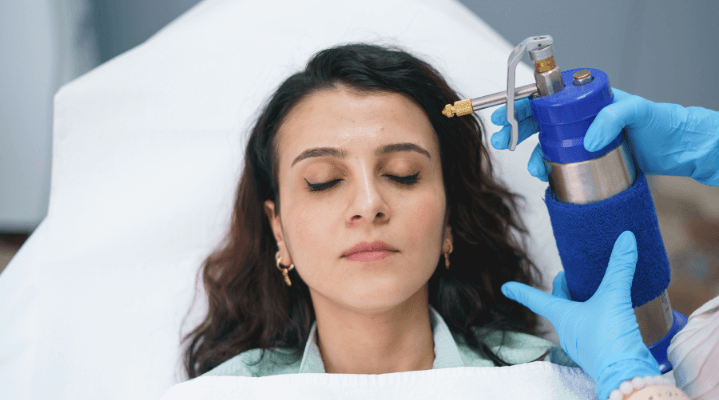Treating Skin Cancer Without Surgery

A range of treatments exist for skin cancer, both surgical and non-surgical. How skin cancer is treated depends on the type of skin cancer and the stage of the disease (how far advanced the cancer is).
We spoke to King Edward VII’s Hospital Consultant Dermatologist, Dr Nilesh Morar, about treatment for skin cancer and when non-surgical options are used to treat the disease.
Non-surgical treatments for non-melanoma skin cancer and pre cancers
The following are non-surgical options for treating non-melanoma skin cancer:
- Cryotherapy – non-melanoma tumours may be, especially if superficial and confined to the top layer of the skin, frozen using liquid nitrogen. The area scabs over and after a few weeks, the scab drops off, taking the skin cancer with it. This may leave a white scar the size of the skin cancer.
- Chemotherapy cream – only used in non-melanoma skin cancer cases confined to the top layer of skin. The chemotherapy creams kill cancer cells without the side-effects associated with regular chemotherapy such as hair loss and nausea.
- Immune stimulating cream – called imiquimod. This cream is used to treat small basal cell carcinomas and actinic keratoses and stimulates the immune system to kill the cancer cells. This cream can cause the skin to become red, flaky and itchy.
- Photodynamic therapy – used to treat basal cell carcinomas, actinic keratoses and Bowen’s disease, this therapy involves using a cream to make the skin light sensitive and then shining a beam of light or natural sunlight onto the skin to kill cancerous cells. It may cause the skin to feel temporarily burnt.
- Radiotherapy – used in larger basal and squamous cell carcinomas. Radiotherapy kills cancer cells. It is mainly used in the early stages of the cancer or after it has started to spread and it may leave the skin feeling tender for a short while afterwards.
Your doctor will discuss your best course of treatment with you.
Non-surgical treatments for melanoma skin cancer
Extensive research has meant that now, not all melanoma skin cancers need to be treated with surgery.
One such treatment is immunotherapy treatment, which can be used to help treat stage 4 (and sometimes stage 3) melanoma skin cancers. Immunotherapy encourages the immune system to kill cancerous cells. There are four main immunotherapy drugs:
- Ipilimumab – used for melanomas that are advanced, cannot be surgically removed or haven’t responded to previous treatment
- Nivolumab – used for melanomas that are advanced or cannot be surgically removed
- Pembrolizumab – used for melanomas that are advanced, have spread or cannot be surgically removed
- Talimogene laherparepvec – used for melanomas that have spread or cannot be surgically removed
Treatments that target genetic causes of melanoma skin cancers are also available. They work by blocking the activity of the faulty BRAF V600 gene that causes cancerous activity and include:
- Vemurafenib – used for advanced melanomas that have spread
- Dabrafenib – used for melanomas that have spread or cannot be surgically removed
- Trametinib – often used in conjunction with dabrafenib for melanomas that have spread or cannot be surgically removed
When surgery is necessary for treating skin cancer
Surgery is often the first option doctors use to treat skin cancers that are not responsive to non-surgical procedures. This involves surgically removing the skin cancer, non-melanoma or melanoma, and some of the surrounding skin to ensure all of the cancerous cells are removed.
Depending on the grade and stage of your skin cancer, you may also require chemotherapy and radiotherapy and further surgery if your cancer has spread.
Mohs Micrographic Surgery (MMS) is used to treat non-melanoma skin cancer if the cancer is in an area of the face where scarring and skin removal should be as minimal as possible, or if doctors think the skin cancer has a high chance of returning.
During this procedure, doctors remove the tumour and a tiny amount of the skin around it. They then check under a microscope to see if there are cancer cells still present in the very edge of the tissue that has been removed. If not, then they can be sure that all of the cancer has been removed. If there are, then they will surgically remove more of the surrounding skin until it is clear of cancerous cells.
Most melanoma skin cancers can be treated using surgical methods, with the area either being closed with stitches or a skin graft performed to cover the area if necessary.
It may not be possible to remove all of the cancerous cells in a stage 4 melanoma or if the melanoma has extensively spread. Your doctor will talk you through other treatments that can help to ease your symptoms and improve your quality of life.
Can skin cancer be prevented?
It’s not always possible to prevent skin cancer, but the majority of skin cancers develop due to repeated exposure to ultraviolet (UV) from the sun. Protecting your skin from these UV rays can significantly decrease your risk of developing skin cancer.
Using a high factor sun cream (sun protection factor 30 or above) on all exposed areas, wearing a hat and covering up with light clothing can all help to protect your skin from the sun. It is important to check that your sun cream has not passed its expiry date and is still effective.
Avoid being outside with exposed skin when the sun is at its strongest (between 11am and 2pm) and avoid using sunbeds. It’s important to be aware of the sun even on cloudy days.
Knowing your own skin, and regularly checking for new moles or recognising if a mole begins to change is important for catching skin cancer early. The NHS mole guide is a helpful resource. Having a professional check your moles can also be helpful to identify any concerns or put your mind at ease.
It’s especially important to take steps to prevent skin cancer if you have many freckles and/or moles, if you have pale skin and red or light hair or if you have a previous or family history of skin cancer.
More information
- If you’re concerned about skin cancer, or you have a mole or lump that’s changing shape or colour or you have a skin lesion or patch of discolouration that won’t heal, make an appointment to see your GP straight away. (Don’t have a GP?)
- The King Edward VII’s Hospital Dermatology Department offers specialised skin cancer treatments including non-surgical treatments and those that minimise skin loss and scarring.










